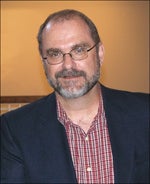FACULTY FEEDBACK
Rethink study's measures
Data alone can’t capture the contributions of many academic departments, particularly the humanities, faculty at East Carolina University told members of a committee appointed to help prioritize academic programs for possible reallocation of resources.
At a forum Wednesday, Nov. 30 on a draft study of ECU’s academic resources, a number of faculty members asked the committee to reconsider the way it measured departments such as anthropology, philosophy and foreign languages, which form the basis for a liberal arts curriculum but don’t necessarily direct students to specific professions.

ECU geography professor Ron Mitchelson is chair of the Program Prioritization Committee.
“We don’t have a lot of the data you are using to measure us,” said John Stevens, department of foreign languages and literatures. “If my French major goes on to be a doctor or a lawyer, does that degree make him a better one? We don’t have a way to measure that.”
“I’d like to see when you’re coming to the chancellor with this study and any recommendations, an acknowledgement of the limits of data,” Stevens said.
“Anthropology has people widely scattered across the university,” said Megan Perry, a faculty member in anthropology. “What we’d like to ask you to do is rethink how you measure centrality … for all departments.”
Chancellor Steve Ballard established the Program Prioritization Committee in May to assess productivity, quality and centrality in the curriculum of academic units across the campus. The draft study released Nov. 15 is phase I of that process. Phase II begins next spring when the committee makes recommendations to the chancellor that could lead to the reallocation of academic resources over the next 5 to 10 years.
The faculty forum was the first of a number of discussions scheduled in response to the preliminary study. These meetings are a chance to provide comments and ask questions about the draft study and the process, said Ron Mitchelson, a professor of geography who chairs the PPC.
In an email message to the university community, Ballard said the committee’s purpose “is to discover areas that might be ‘right-sized’ with prioritized growth and development in some areas to be offset with reductions in others.”
Ballard described the process as a “rational and systematic approach for dealing with difficult times.”
ECU took a 16.1 percent budget cut in state funding for the 2011-2012 fiscal year, following four consecutive years of state budget cuts. That has meant fewer sections of courses, larger classes and as many as 200 jobs have been eliminated on campus.
A process such as this one is necessary, Mitchelson told fellow faculty members Wednesday.
“This is not going away,” he said.
“This program prioritization process is devoted to making East Carolina University a stronger institution as we emerge from this difficult time in our state’s and our nation’s histories,” he said.
Feedback from forums such as Wednesday’s will play a key part in shaping the final version and any recommendations, due to Ballard in January, Mitchelson said.
“It’s obviously a draft, a work in progress,” Mitchelson said.
The draft study used information and observations provided by individual departments at ECU. The committee took that information and applied a formula to assign values to programs and studies.
Mitchelson said his committee has worked hard to make the process transparent and inclusive, engaging each department in developing criteria and gathering data. The committee’s work, as well as the evaluation sheet for each program, is available on a university web page devoted to program prioritization. (Go to www.ecu.edu/ppc.)
The second phase of the PPC’s work, investigation of any possible reorganization, would take place spring semester 2012.